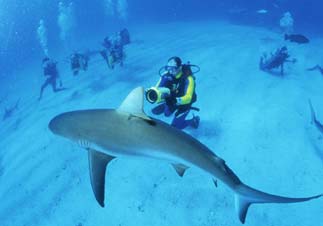
|
|
|
|
|
|
Shark Info (12-15-2000) |
Author |
|
Intro: |
Diving with large sharks - a foolish pastime or scientific necessity? |
Shark Info |
Main article: |
Diving with large sharks - a foolish pastime or scientific necessity? |
Dr. E. K. Ritter |
Article 1: |
Of what real advantage is the list of endangered shark species? |
Shark Info |
Article 2: |
Initiative to prohibit shark feedings off the coast of Florida rejected |
Richard Finkus |
Article 3: |
Shark Info |
|
Fact Sheet: |
Dr. E. K. Ritter |
|
Initiative to prohibit shark feedings off the coast of Florida rejected
IntroductionControversies between supporters and opponents of shark feedings have existed since this form of diving excursion was called to life more than 30 years ago. Some people believe they condition the sharks (see box) to associate food with people, thus increasing the danger for people when humans carry no food with them. In such cases the sharks could become aggressive and bite (a very anthropomorphic argument). On the other hand, supporters consider it a useful tool to improve understanding and a significant way of helping scuba divers become better acquainted with these animals. However, both supporters and scientists do agree that structured interactive shark diving should be carried out in accordance with some basic guidelines and that certain feeding techniques such as hand or pole feedings should be prohibited. A governmental resolution in Florida - where most shark accidents occur - should now regulate the problem legally. On September 8, 2000, the Florida Fish & Wildlife Conservation Commission (FWCC), the government office responsible for animal protection in Florida, rejected the bill which would have prohibited the feeding of sharks and other marine animals in Florida but reported that guidelines were being established to allow more structured feedings. Additional efforts to support the initiative on municipal level have also failed. Origin of the initiativeIn September 1999 the South Florida Spearfishing Club under the direction of Steve Pacardi and Dave Earp launched a campaign to eliminate the feeding of sharks and other marine animals in Florida waters, claiming they would condition sharks and result in accidents. Leaflets were distributed and petitions were laid out in various places to help secure the necessary votes. As always when sharks become the center of interest and their bad reputation is exploited, people do not hesitate to depict them as stupid, primitive predators. The following slogans were thus found on these petitions, e.g. "... sharks will soon learn to associate humans with food and this will lead to attacks against family and loved ones ... ", or: " ... don't let your child or family become the first victim ... ". Although over the past years many efforts have been made to correct the exaggerated dangerous image of sharks, some individual scientists decided to support the initiative and by doing so helped to rekindle this old negative image. Main weakness in opponents' argumentsThe first public hearing held in February 2000 in Fort Lauderdale was loaded with
emotions and opponents did not fail to mention every case in which feedings resulted
in later attacks on humans. The cited cases designed to underline this chain reaction
were, however, not the main weakness of their arguments, but rather the fact that the
feedings did not involve sharks but rather muray eels, alligators and bears. Without
having performed the respective research, it is very questionable to apply conclusions
made for one species of animal on another simply because it concerns feeding and
wild animals. Shark accidents resulting from feedings are very rare and in no way
comparable to the number of accidents experienced with other animal groups. During
the hearing the initiators could not even cite one feeding accident with sharks. A second meeting to prohibit feedings was held several months later in Florida's capital, Tallahassee. Here too, representatives of professional diving organizations, anglers and scientists took part and presented their arguments to the Commission for the second time, but again no convincing basis for accepting such a ban could be found. The final and decisive hearing was held on September 8, 2000, at which 9 to 0 votes clearly rejected the initiative to prohibit shark feedings. At the same time, however, those organizations with commercial interests in shark feedings were assigned with establishing an association whose task would be to develop binding guidelines for such feedings. However, to what extent the adherence to such guidelines can be controlled remains to be seen. For this purpose the GIMEC (Global Interactive Marine Experiences Council), whose members represent different interest groups, was established to act as an advisory office. Dr. Erich Ritter, a Swiss living in Florida and scientific advisor to the Shark Foundation, was asked to join them. Their task in the coming months is to develop guidelines for shark feedings which will be binding on all who offer such touristic services in Florida. The educational value of interactive shark divingInteractive shark diving has an almost 30-year-old history. The leading nation when it comes to this form of diving excursion are the Bahamas which counts about 30 such diving bases. The only known accidents have occurred when diving instructors failed to offer the bait in a proper manner, but no such incidents are documented with scuba divers. Various forms of shark diving are offered in more than 100 locations around the world. When carried out properly, they no doubt can produce an enormous educational and psychological effect. Such educational work is necessary to reduce prejudices both for the sake of the sharks as well as other animals. Only by spreading a deeper understanding for biological connections and the animals themselves can we prevent endangered animals from being decimated or even eliminated due to ignorance.
* Richard Finkus is shark research coordinator with the PADI diving association. May be published only by indicating the source: Shark Info / Richard Finkus |
|
|
|
|
|
|||||
